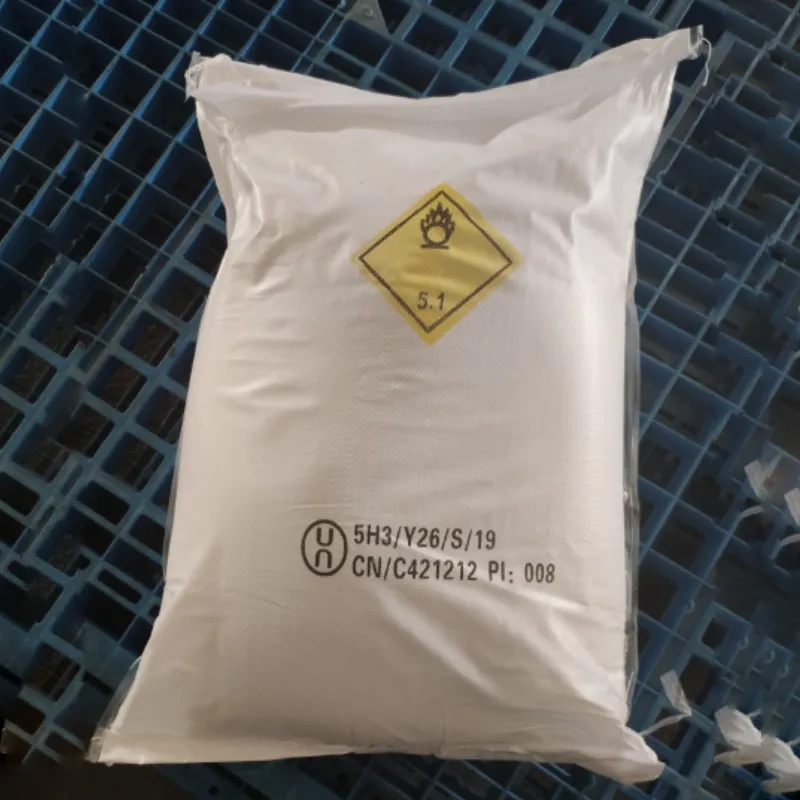
tri chloro isocyanuric acid
Understanding Trichloroisocyanuric Acid Its Uses and Safety
Trichloroisocyanuric acid (TCCA) is a versatile chemical compound widely recognized for its effectiveness as a disinfectant, sanitizer, and algicide. With the chemical formula C3Cl3N3O3, it belongs to the family of isocyanurates, characterized by a six-membered ring structure that contains alternating carbon and nitrogen atoms. TCCA plays an essential role in several industries, particularly in water treatment, swimming pool maintenance, and various sanitation applications. In this article, we will explore the properties, applications, and safety considerations related to trichloroisocyanuric acid.
Properties of Trichloroisocyanuric Acid
TCCA is a white, crystalline solid that is highly soluble in water, releasing chlorine upon dissolution. This property makes it an effective chlorine donor. One of the primary reasons for its popularity in water treatment processes is its stability and long shelf life compared to other chlorine sources. When it comes to effectiveness, TCCA can provide a sustained level of chlorination, which is crucial for maintaining water quality and preventing the growth of harmful microorganisms.
The compound is also known for its moderate toxicity, which is significantly lower than that of elemental chlorine. However, like any chemical, it must be handled with care to avoid adverse health effects.
Applications of TCCA
Trichloroisocyanuric acid is widely used in swimming pool maintenance due to its excellent disinfecting properties. It helps to ensure that the water is free of harmful bacteria and algae, providing a safe environment for swimmers. TCCA is often available in tablet or granular form, allowing for easy application. Regular addition of TCCA ensures that chlorine levels are maintained, preventing the emergence of algae blooms and enhancing overall water quality.
2. Water Treatment
tri chloro isocyanuric acid

Beyond pool sanitation, TCCA is employed in the treatment of drinking water and wastewater. It effectively eliminates pathogens, including bacteria and viruses, making it crucial for public health. In municipal water systems, TCCA contributes to the disinfection process, rendering water safe for consumption. Its prolonged residual effect ensures ongoing protection against recontamination in treated water.
3. Industrial Uses
TCCA finds applications in various industrial processes, such as in the textile and paper industries. It is used as a bleaching agent and disinfectant to maintain hygiene in manufacturing facilities. Moreover, TCCA is employed in some agricultural settings for the disinfection of irrigation water and in livestock farms to control pathogens.
Safety Considerations
While trichloroisocyanuric acid is effective as a disinfectant, it must be handled with caution. Ingesting or inhaling TCCA can cause adverse health effects, including irritation of the skin, eyes, and respiratory tract. Therefore, personal protective equipment such as gloves and goggles should be used when handling TCCA.
It is also crucial to store TCCA in a cool, dry place, away from incompatible substances such as acids and organic materials, which can lead to dangerous reactions. Proper labeling and adherence to regulatory guidelines can significantly mitigate risks associated with its use.
Conclusion
Trichloroisocyanuric acid is an essential compound in various fields, particularly in sanitation and water treatment. Its effectiveness, ease of use, and stability make it a popular choice for maintaining water quality in pools and municipal systems alike. While the benefits of TCCA are significant, safety precautions must be taken to protect against potential hazards. Understanding both the applications and safety considerations associated with TCCA can lead to its responsible use, thereby ensuring public health and safety in environments where it is applied.
-
Pure Sodium Dichloroisocyanurate Dihydrate | Powerful DisinfectantNewsAug.29,2025
-
Industrial Chemicals: Quality & Purity for Every IndustryNewsAug.28,2025
-
Nitrile Rubber Honoring Strict Production StandardsNewsAug.22,2025
-
Aspartame Ingredients Honoring Food Safety ValuesNewsAug.22,2025
-
Fertilizer for Balanced Plant NutritionNewsAug.22,2025
-
Cyanide Gold Processing with High Purity AdditivesNewsAug.22,2025
-
Formic Acid in Textile Dyeing ApplicationsNewsAug.22,2025
Hebei Tenger Chemical Technology Co., Ltd. focuses on the chemical industry and is committed to the export service of chemical raw materials.
-

view more DiethanolisopropanolamineIn the ever-growing field of chemical solutions, diethanolisopropanolamine (DEIPA) stands out as a versatile and important compound. Due to its unique chemical structure and properties, DEIPA is of interest to various industries including construction, personal care, and agriculture. -

view more TriisopropanolamineTriisopropanolamine (TIPA) alkanol amine substance, is a kind of alcohol amine compound with amino and alcohol hydroxyl, and because of its molecules contains both amino and hydroxyl. -

view more Tetramethyl Thiuram DisulfideTetramethyl thiuram disulfide, also known as TMTD, is a white to light-yellow powder with a distinct sulfur-like odor. It is soluble in organic solvents such as benzene, acetone, and ethyl acetate, making it highly versatile for use in different formulations. TMTD is known for its excellent vulcanization acceleration properties, which makes it a key ingredient in the production of rubber products. Additionally, it acts as an effective fungicide and bactericide, making it valuable in agricultural applications. Its high purity and stability ensure consistent performance, making it a preferred choice for manufacturers across various industries.





